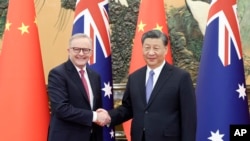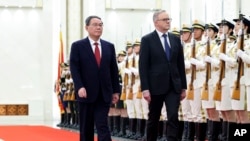Australian Prime Minister Anthony Albanese has invited Chinese President Xi Jinping to Canberra after what he called a “positive” landmark summit in Beijing.
Albanese is the first Australian prime minister to visit mainland China since 2016, following years of friction. The Canberra government says his trip to China is an important step in the stabilization of diplomatic relations after various political and trade disputes.
Amid disagreements over various geopolitical issues, including human rights and the origins of COVID-19, Beijing imposed bans and tariffs on a range of Australian imports.
Albanese has sought a less-confrontational approach to China after an election win in May 2022, with the aim of stabilizing relations with Australia’s main trading partner while acknowledging areas of disagreement.
Albanese said his meeting Monday with Chinese President Xi Jinping was “one of goodwill.” He said he raised the case of the Australian writer and democracy activist Yang Hengjun, who has been detained by China for almost five years.
Australian government officials are hopeful that the last remaining Chinese restrictions on the country’s export commodities, including seafood and beef, will be scrapped by the end of the year. China has also said it would undertake a five-month review of duties it imposed on Australian wine.
Albanese told reporters in Beijing that his talks with the Chinese leader were broad.
“I did discuss international issues with President Xi and the importance of stability in the region and open channels of communication," he said. "We also discussed our bilateral relationship. I raised consular and human rights issues during the meeting as well.”
But opposition Liberal Party Senator Simon Birmingham told the Australian Broadcasting Corp. Tuesday that the Canberra government must remain vigilant about China’s ambitions.
“We have seen Australia’s and other international security chiefs provide new warnings about the extent of Chinese cyber espionage," he said. "We have seen the Chinese navy undertake aggressive action against the Philippines in the South China Sea. Whilst this visit might be positive, the Albanese government [must] not get any rose-colored glasses about the challenges that are there as well.”
China accounts for about a third of Australia’s global trade. Analysts say that China is highly dependent on Australian raw materials, including iron ore and liquefied natural gas, to help build its economy.
Albanese has invited Xi to visit Australia in the near future, while the Chinese president also asked the Australian prime minister to return to China and visit other parts of his country.





